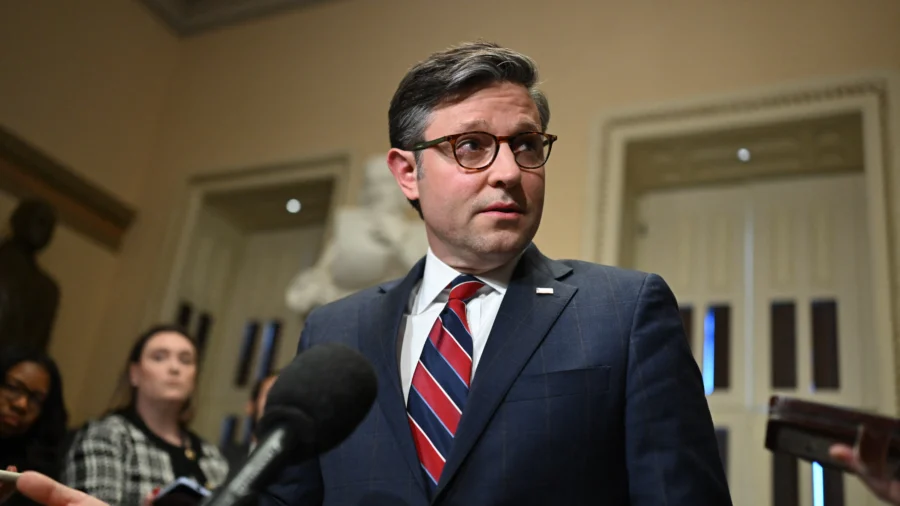Following a meeting with Ukrainian President Volodymyr Zelenskyy on Tuesday, House Speaker Mike Johnson (R-La.) is standing by Republican calls to tie new rounds of U.S. aid to Ukraine to stronger border security policies.
Mr. Zelenskyy visited Capitol Hill on Tuesday to discuss the ongoing war between Ukraine and Russia and make the case for additional rounds of U.S. military aid for Ukraine. The visit comes as Ukraine has exhausted much of the international aid it has received to continue fighting Russia.
Among Mr. Zelenskyy’s stops on Tuesday was a meeting with Mr. Johnson, who has been reluctant to approve more U.S. spending on Ukraine until certain Republican policy demands are met.
Congress is currently considering a $111 billion supplemental spending bill that contains $15 billion in direct Department of Defense support for Ukraine’s military, about $14 billion in additional U.S. economic assistance to Ukraine, and tens of billions in additional spending to expand U.S. arms production to rearm Ukraine. In addition to tens of billions in new Ukraine-related spending, the proposed supplemental spending bill also proposes tens of billions for U.S. military aid to Israel, spending to support allies and partner nations in the Indo-Pacific region, and new spending for U.S. border and immigration personnel and equipment.
Republicans have argued that the new border and immigration-related spending doesn’t do enough to address their long-running concerns about U.S. border security and have insisted they won’t support the $111 billion spending supplemental unless it comes with a deal to adopt more restrictive policies for when border crossers can request asylum and when border officials can grant temporary U.S. entry to border crossers through parole programs. The $111 billion spending supplemental failed in a procedural vote last week, as Republican border security demands remained unmet.
Following his meeting with the Ukrainian president on Tuesday afternoon, Mr. Johnson said he’d had a “good meeting” but voiced his continued support for Republican border security demands as a condition of support for the spending supplemental.
“Our first condition on any national security supplemental spending package is about our own national security first,” Mr. Johnson said. “The border is an absolute catastrophe, and this is because of the policies of this White House and this Administration.”
Beyond the specific supplemental spending bill, Mr. Johnson also reiterated the calls of many Republicans seeking clarity from the Biden administration about the objective of U.S. support for Ukraine.
“I have asked the White House since the day that I was handed the gavel as Speaker for clarity. We need a clear articulation of the strategy to allow Ukraine to win, and thus far, their responses have been insufficient and have not provided us the clarity and the detail that we requested over and over since literally 24 hours after I was handed the gavel as Speaker of the House,” he said. “What the Biden Administration seems to be asking for is billions of additional dollars with no appropriate oversight, no clear strategy to win, and none of the answers that I think the American people are owed.”
Mr. Johnson said the conditions Republicans are pressing for on Ukraine-related aid reflect “the conditions of the American people,” and his office stands “resolute” on the issue.
Mr. Zelenskyy was also able to get a separate meeting with a bipartisan group of U.S. senators and another meeting with House Democrat leaders on Tuesday. House Democratic Caucus Chair Pete Aguilar (D-Calif.) criticized Mr. Johnson for not setting up a bipartisan House meeting similar to the Senate’s.
“We just thank [Mr. Zelenskyy] for coming out, and the courage to come here. Unfortunately, House Republicans didn’t extend that offer to meet like the Senate did—to meet with all members,” Mr. Aguilar said at a Tuesday press conference. “It would have been nice if Speaker Johnson conveyed that, but he didn’t.”
Lawmakers are running out of time to reach a deal on the supplemental spending package before Congress breaks for the rest of the year. Congress is tentatively scheduled to break after Friday, Dec. 15. In a Tuesday interview with The Hugh Hewitt Show, Mr. Johnson said he’s not interested in keeping the House in session beyond Friday, waiting to hold a vote while Senate negotiators appear far from reaching a deal on Republican border security demands.

